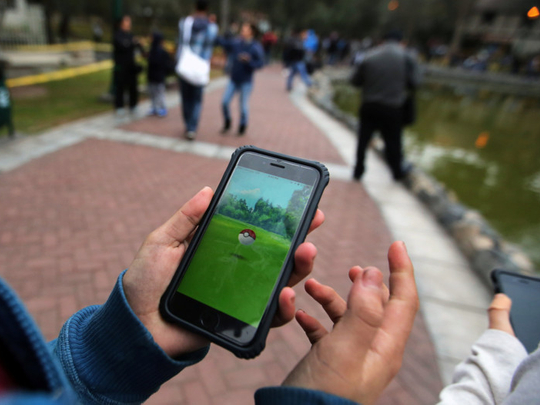
Obesity and diabetes are on the rise and, if left unchecked, will impact the region financially and socially. Emile Salhab, principal, Booz Allen Hamilton, suggests a dose of gamification to counter this.
The wild success of the mobile game Pokemon Go has popularised augmented reality and made it viable and mainstream. And it has also inspired gamers to get up and get active.
Pokemon Go involves lots of actual walking and running around as players try to “catch” Pokemon creatures and “level up”. Videos on YouTube show hundreds of players stampeding around public spaces as they locate, capture, battle and train virtual creatures.
During the days after the app’s release, social media was awash with reports of Pokemon Go players actually complaining of sore legs after a day of exciting and active gaming.
Governments in the Gulf Cooperation Council (GCC) countries need to get creative to encourage young people to become more active. What if regional governments — already being acknowledged globally for their initiatives to embrace innovation — leveraged technology to address the challenge? Pokemon Go is a great example of how technology can galvanise erstwhile couch potatoes.
That’s right: It’s a mobile game that can make you healthier. So let’s gamify exercise.
The rise of Pokemon Go is an especially interesting development at a time when GCC governments are investing heavily to combat obesity and diabetes — the former dramatically increasing the risk of the latter.
In the UAE, for example, 66 per cent of men and 60 per cent of women are overweight or obese. And nearly a fifth of the population suffers from diabetes. And if the trend continues, in the next 25 years, diabetes could affect half of the population — straining the health-care system.
The fight against obesity and diabetes requires more than just medicine or surgery — it needs a behavioural shift. And changing the habits of a whole population isn’t easy. In GCC countries, young people live largely sedentary lifestyles and youth obesity rates are even higher than adult rates. Months of extreme heat limit outdoor activities and entertainment via mobile devices seems to be fast replacing other forms of recreation.
On the other hand, some Pokemon Go users are reportedly taking 10,000-plus steps in a two-hour session. The United Kingdom National Obesity Forum says that a person who walks between 7,000 to 10,000 steps a day qualifies as “moderately active”. There’s even an indicator within the game that lets you know the distance you have travelled on the way to a 100km target.
“Gamification” is the act of applying game design (or game-like features such as point scoring) to an everyday activity, in this case exercise. For many people who do not get enough physical exercise, playing Pokemon Go is the primary goal of them taking a walk today. Even if someone hates the idea of being physically active, he or she may love the idea of catching Pokemon, and therefore they are incentivised to get out of the house and walk around.
An added benefit of that would be improved fitness levels. Jawbone, which makes the UP fitness tracker, studied users who mentioned Pokemon Go in their comments and found that, on an average, they were walking 62.5 per cent more than usual.
Users of Under Armour’s MyFitnessPal workouts have started entering Pokemon Go as a workout, reportedly burning about 250-300 calories a session. To put that into context, a 72.5 kg person would typically burn around 98 calories in 10 minutes of vigorous-intensity abdominal crunches.
GCC governments could easily incorporate immersive, active games like Pokemon Go into their health education programmes. It could be especially effective when aligned with policies such as offering cash incentives, and the chance to spend time with national leaders.
The infrastructure is already in place: The GCC has some of the highest smartphone penetration rates in the world.
And the size and scale of the region’s mega-malls provides the perfect location for users to walk thousands of steps during the summer months. However, regulations and privacy concerns need to be kept in mind while implementing gamification, to ensure it is in permitted places and in line with local laws.
Gamifying exercise and supporting it through government and private sector initiatives (mall fitness challenges for example), can help make exercising something that people want to do. It’s this kind of lasting behaviour change that is required in the region to fight obesity and related ailments which, if left unchecked, will result in direct economic costs through increased government health-care spending and indirect costs to the economy through reduced productivity. The conditions are perfect for gamification to have a serious and positive impact on the health of the region and its residents. All we need is a dose of behavioural change, supported by a healthy prescription of Pokemon Go.
— Emile Salhab is Principal at Booz Allen Hamilton Mena








